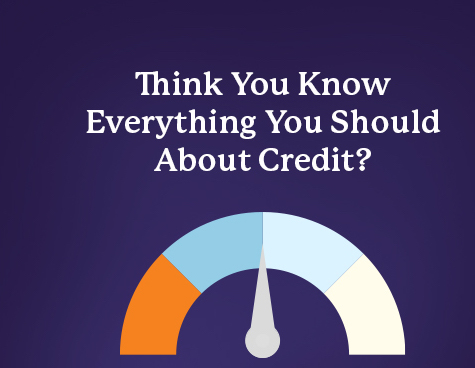Credit
January 19, 2021
Think You Know Everything You Should About Credit?

Jean Chatzky Aug. 24, 2020
A new survey shows that a good many of us might want to think again.
You’re probably familiar with the wage gap, but have you heard of the credit knowledge gap? According to a recent survey, a significant number of people likely to apply for credit in the next year could be lacking key knowledge about how credit scores work – and that could hold them back when it comes to qualifying for the credit they’re looking for.
The Consumer Federation of America (CFA) and VantageScore recently published their 10th annual credit score survey, and here’s the concerning part: When asked integral questions about credit scores — such as whether keeping credit card balances low can raise scores, what a good score actually is and how many credit scores consumers have — a good chunk of respondents did not know the answers.
If you’re interested in shoring up your credit score knowledge and seeing where you stand, we’ve got you covered with actionable steps for getting started.
Know what goes into the calculation
If you’re aiming to raise (or maintain) your current credit score, it’s important to know as much as you can about the way it’s calculated. There are different models for calculating credit score but generally, the factors that go into scoring remain relatively consistent. The biggest weight is on payment history (whether you’ve paid on time and/or missed any payments) and credit utilization (the percentage of credit you have available to you that you’re using). If you’re working on your score, aim to keep your credit utilization ratio below 30 percent — ideally 10 percent — of what’s available to you. Other important factors include length of credit history (longer is better, which argues for keeping your oldest accounts open), new credit (don’t shop for credit you don’t need), and types of credit accounts (ideally, it helps to have a mix.)
Understand how scores break down
Only 33 percent of people surveyed understand the fact that what credit scores are meant to measure are the risk that a consumer won’t repay a loan (Fourteen percent mistakenly think they measure knowledge or attitude toward consumer credit.) Essentially, lenders use credit scores to make sure they’ll get their money back. And, there are specific benchmarks where – if you meet them – you will qualify for lower interest rates. For example, with a VantageScore of under 600, you have poor credit, but at 601 to 660 you move into the fair credit range. At 661, you move into the good credit range and once you hit 781 your credit is considered excellent. It can make a big difference – something the survey showed only a minority of people understand. On a $20,000, 60-month auto loan, a borrower with a low credit score would likely pay more than $5,000 in interest than a borrower with a high score, for example according to the research. Low scores may qualify borrowers for subprime auto loans only, with annual interest rates frequently exceeding 20 percent.
Check your credit report and score on a regular basis
You’ve probably heard the saying: Whatever gets measured, gets managed. In the world of credit, measuring means keeping a watchful eye on two things: Your credit report and your credit score. You have access to both, for free*, via SavvyMoney. When checking your credit report, you’re looking for two things in particular: mistakes and fraud. About ⅕ of credit reports have mistakes (although most of these mistakes are not significant enough to damage your score, it’s worth clearing them up — do that by filing a report online with the credit bureau that made the mistake, Equifax, Experian or TransUnion.) Fraud is the bigger problem. Scam artists come out of the woodwork during difficult times and coronavirus is no exception. If you see activity on your report that doesn’t belong to you, report it to the credit bureaus immediately — but also to the Federal Trade Commission.
Just understand — this is a process that can take time. Although paying down big chunks of debt, for example, can boost your utilization score fairly quickly, other factors take longer to move. Over six months to a year, however, good credit habits can make a meaningful difference.
* THIS NOTICE IS REQUIRED BY LAW. Read more at FTC.gov.
You have the right to a free credit report from AnnualCreditReport.com or 877-322-8228, the only authorized source under federal law. Take me to the authorized source.